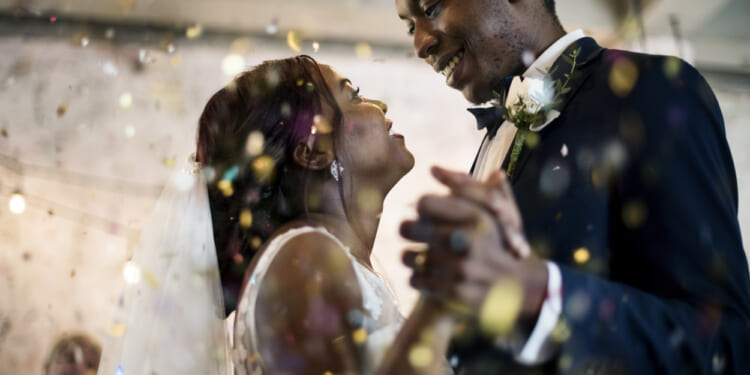
Earlier this week, Pew Research Center dropped a sobering data point into the cultural conversation. Using survey work from the University of Michigan, they asked 12th graders a simple question: Do you want to get married someday?
As of 2023, the overall percentage of participants who answered in the affirmative was 67% — a 13% decrease from 1993. Perhaps the most noteworthy piece of data from the study, though, was that while the percentage of boys who claimed to desire marriage has remained virtually unchanged over 30 years, the percentage of girls expressing the same desire has decreased by fully 22 percentage points.
As the study did not include qualitative data or open-ended questions, the findings do not provide us with reasons why students responded the way they did. We don’t get girls’ own reasoning — whether it’s fear of divorce, a drive for independence, disillusionment with what marriage looks like around them, or something else entirely. All we know is that across the board, fewer young people picture marriage in their future, and girls, once the most marriage-minded, are now the ones turning away in the greatest numbers.
Perhaps predictably, conservative pundits have rushed to point the finger at feminism. And to be fair, in a culture saturated with leftist and neo-feminist talking points, it’s not hard to see why. Girls are raised on a steady drip of “boss babe” empowerment that equates independence with isolation and tells them a man is, at best, optional décor. Pop-culture influencers cheer on the idea of freezing your eggs so you can live your “real life” first: travel hard, hook up freely, chase the wild oats before you even think about motherhood. Add in the growing normalization of throuples, polyamory, and every conceivable “alternative arrangement,” and you end up with a message that treats lifelong monogamy as archaic and marriage as a limiting, vaguely oppressive relic. When that’s the ambient noise of girlhood, it’s not exactly shocking that fewer young women imagine marriage as something worth wanting.
But we expect the left to war against traditional family. They’ve been doing it for decades, so it’s not entirely new or unsurprising when they do. And we can blame them if we want, but that strikes me as rather fatalistic, and it fails to contend with a more important question I think we’d mostly rather avoid: Why, in all the years the conservative right has tirelessly claimed to champion family, have we failed to actually make family life look compelling, joyful, or worth aspiring to? Why haven’t we built communities where marriage is strengthened, not strained, where men are formed into the kind of husbands women want to marry, and where women aren’t left carrying the emotional load alone? Why hasn’t our rhetoric translated into a lived reality that’s visibly better than the chaos offered elsewhere?
I’ve spent a whole lot of blog space these past few years punching right for the greater good. I’ve never hesitated to call out the blind spots in my own political and religious camps, especially the ones that alienate the very women we claim we’re trying to reach. I don’t enjoy being a leaky faucet in these conversations, but the data are drawing a giant X on the map right now, and I find myself praying we’d finally get strategic about our messaging instead of repeating the same tired mistakes.
Because let’s be honest: there is no shortage of “Get married and pop out more babies than you can afford” rhetoric on the right. It’s everywhere, often wrapped in hollow praise of motherhood as the highest calling, usually delivered by men who openly belittle any woman whose life doesn’t fit their stay-at-home wife template.
Sure, I can think of countless left-coded narratives that discourage women from marrying. And of course, widespread porn addiction is warping relationships on a scale we haven’t even begun to reckon with. All of that is real. All of that matters.
But the right is the side preaching that marriage is noble, essential, and foundational. So it’s worth asking what women actually hear from that same side:
They hear men shouting, “repeal the 19th,” laughing off dehumanizing comments as “locker-room talk.”
They watch influencers rank women’s “value” like livestock, dismiss anyone over 25 as used-up, and then watch allegedly Christian commentators hand platforms to misogynists like Nick Fuentes and Andrew Tate, men who have nothing remotely moral, let alone Christlike, to offer.
They hear their intelligence mocked as rebellion, their accomplishments dismissed as feminist pride, and their boundaries treated as evidence of being “difficult.”
They’re told to revere marriage — but only a version of marriage built on rigid obedience and rigid roles, with a thousand warnings about what happens to women who step out of line.
They watch conservative voices rush to empathize with violent men while interrogating battered women about their purity, their decisions, and their failure to submit enough.
So with messaging like this coming from the very people insisting marriage is the pinnacle of a woman’s life … is it any surprise so many young women are looking at the landscape and saying, “Why on earth would I sign up for that?”
And of course, we can’t dodge the deeper question: What have these young people actually seen marriage look like? Is it any better inside the Church than outside? Is there less abuse? Less porn addiction? More peace, reverence, love, and stability? Or have we simply wrapped the same dysfunction in religious language and hoped no one would notice?
We can preach marriage until we’re blue in the face, but if we truly want young people to choose it, the most powerful thing we can do is live out marriages that are healthy, joyful, and visibly good. That will always speak louder than demonizing those who have reservations.
You can write an entire epistle about the glory of apple pie — but until someone tastes it for themselves and finds it sweet, it’s just words on a page. Marriage is no different. The witness of a beautiful life will always out-preach the loudest sermon.
And just to be clear, modeling a healthy marriage does not mean curating a perfect tradwife Instagram aesthetic. It doesn’t look like staging your life into neat, tidy gender cages with perfect angel children sitting stiffly in a pew so the world can applaud your holiness. In fact, the more energy you spend trying to make a marriage look healthy, the more suspicious it becomes to a generation that can smell manufactured virtue and curated fakery from a mile away.
A genuinely healthy marriage isn’t a performance. It’s not a costume or a brand. It’s not matching outfits and Bible verses under perfect lighting. A genuinely healthy marriage is lived in the real world. It’s forgiveness after a hard conversation. It’s the shared load of dishes and bills, It’s tenderness that doesn’t need to be advertised to be true.
And today’s young women (and young men) need to see that marriage generates true joy. They need to see that marriage, at its best, is not a cage or a competition, but a refuge, something that strengthens you, steadies you, and makes the hard parts of life more bearable because you’re no longer carrying them alone.
The next generation is not demanding a flawless institution or a fantasy version of marriage that never existed in the first place. What they are asking for is evidence, real, lived evidence that marriage can still be something good. Something healing. Something worth the risk.
And if we want them to believe that, then the burden is on us, not them.
It’s on us to build marriages that are safer than the world outside. It’s on us to raise sons who honor women and daughters who know they deserve honor. It’s on us to create communities where commitment is nurtured instead of mocked, where vulnerability is met with compassion instead of control, where covenant actually means something.
If we want a generation to choose marriage, we have to make marriage look like a place worth choosing.
The future of marriage won’t be secured by lectures, shame campaigns, or partisan blame. It will be secured by people whose lives quietly and consistently testify, “This is good. This is possible. Come and see.”
Originally published at Honest to Goodness.
Kaeley Harms, co-founder of Hands Across the Aisle Women’s Coalition, is a Christian feminist who rarely fits into boxes. She is a truth teller, envelope pusher, Jesus follower, abuse survivor, writer, wife, mom, and lover of words aptly spoken.

















